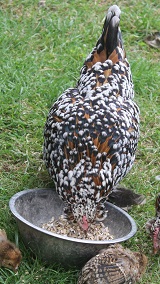Study self sufficiency and learn how to keep poultry.
 A home study course looking at self-sufficiency with a specialism in poultry care and breeding.
A home study course looking at self-sufficiency with a specialism in poultry care and breeding.- Suitable for anyone interested in becoming self-sufficiency and focussing on the care of poultry.
- Study 2 modules on Self Sufficiency.
- Study 1 module on Poultry husbandry.
- Practice your new-found knowledge with a practical Workplace Project.
COURSE STRUCTURE AND CONTENT
Start at any time - study at a pace that suits you, and with full tutor support whilst you study.
The course comprises three Core Modules (Self Sufficiency I, Self Sufficiency II, Poultry) plus a 200 hour Workplace Project.
HOW THE PROFICIENCY AWARD IS ASSESSED
The Proficiency Award In Self Sufficiency With Specialism In Poultry requires 500 hours of study. It is made up of three 100 hour modules and a workplace project.
To pass the course –
- Pass all assignments on the three 100 hour modules. There will be an assignment at the end of each lesson to submit to your tutor for marking and feedback.
- Pass three examinations – one on each module. These are usually taken at the end of the module and can be arranged at a time and location to suit you.
- Complete a Workplace Project. The project should last around 200 hours. There are four options available to you to satisfy this requirement. Don’t worry if you are not sure at this stage, your tutor will be there to help you every step of the way. This includes evidence of work experience or other studies or workshops, a research project or completion of Workshop I
THE ADVANTAGES OF STUDYING WITH ACS
- Our courses are written and taught by experienced professionals, so you know you can expect a high quality of teaching and support.
- You can start the course at any time and study at your own pace.
- Fit your studies around your own busy lifestyle - we provide full tutor support during your studies.
- Study where you want to - online studies offer the flexibility for you to determine where and when you study.
ANY QUESTIONS?
You can enrol on the course today!
If you have any questions, please do get in touch with us - connect with our expert tutors, use our FREE COURSE COUNSELLING SERVICE.